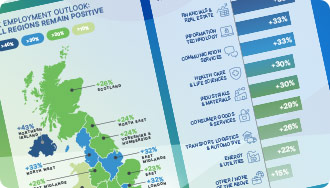
ManpowerGroup Employment Outlook Survey – Q1 2024
- ManpowerGroup UK calls on employers to focus on skills and potential as opposed to traditional hiring practices based on job titles and formal qualifications.
- Reflecting on the publication of its latest global talent shortage insights and UK-wide Employment Outlook Survey for Q1 2024, ManpowerGroup reports skills gaps across all sectors have reached an 18-year high.
- National employer hiring intent for Q1 remains steady at +27%* – led by Financials and Real Estate (+38%), IT (+33%) and Communications Services (+33%) – despite ongoing high inflation and economic uncertainty.
- A new vision is needed to ensure increased economic participation rates, more engaged and inclusive workforces and an uptick in innovation and productivity during the year ahead.
Data from the latest ManpowerGroup Employment Outlook Survey of UK hiring managers indicates that cross-sector skills gaps have reached a record 18-year high of 80% nationally, whilst hiring plans for Q1 2024 remain cautious-yet-steady, quarter-on-quarter, with a net hiring intent of +27% – evidence which supports the need to evolve current hiring practices if UK businesses are to remain competitive, both domestically as well as internationally.
“An inhibiting paradox has long afflicted the UK job market – namely, a loosening of hiring demand on one hand contrasting with record long-term job vacancy volumes on the other,” observes Michael Stull, Director at ManpowerGroup UK.
“The persistent mismatch between the skills employers are looking for and the abilities candidates have – for specialist positions, in particular – presents employers across Britain with a stark choice: either continue fishing in the same pond in the same way for skills that are scarce or try a new approach by adopting skills-based hiring. The former keeps us on a continued path towards economic stagnation in 2024, whilst the latter has potential to alleviate talent shortages, drive innovation and create more diverse workforces – even in the face of stiffening economic headwinds.”
2023 has been a year of adjustment, with many organisations applying headcount reductions as a correction for the unprecedented over-hiring rates seen over the past two years.













